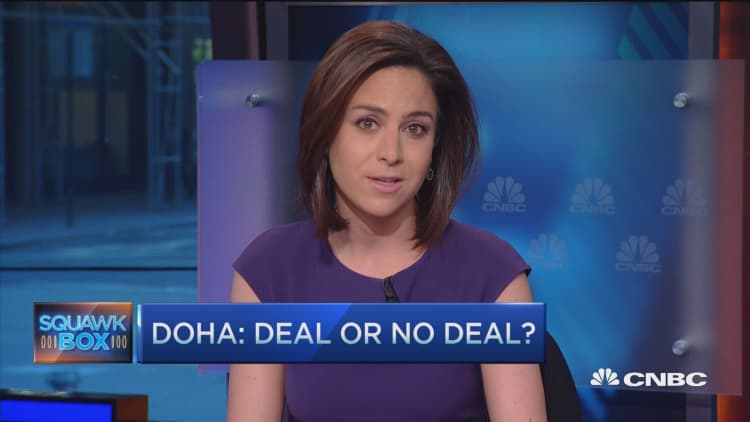
Oil producers have a better than 50/50 chance of agreeing to freeze output when they meet in Doha this weekend, and such a deal would support oil prices even with a global glut, according to a new CNBC Oil Survey.
A vast majority of respondents — 88 percent — also believe oil prices found a bottom earlier this year. Fifty-three percent expect West Texas Intermediate to end 2016 at $40 to $50 per barrel, while 30 percent see prices rising above $50. As for Brent crude, 48 percent forecast a year-end price of $40 to $50 a barrel, and 39 percent are more bullish and are looking for a price above $50.
If a freeze deal is not reached by the OPEC and non-OPEC oil producers in Doha, 55 percent of respondents expect oil prices to fall but not reach new lows. Thirty-six percent said the price will not fall much at all without a deal, as low expectations were largely priced in.
"The freeze distracts from the important supply side adjustments going on in the market right now. It buys OPEC time, and helps reaffirm their importance in the aftermath of a failed December meeting," wrote Michael Cohen, head of energy commodities research at Barclays.
The survey of 23 top industry analysts, traders and strategists was conducted between April 4 and 14.
Read MoreUS oil output drop is buying time for OPEC
Sixty-one percent said they believe a Doha production freeze would support oil prices. Fifty-six percent gave producers 50 percent or greater odds of striking deal to freeze production. Thirty-four percent saw a 70 percent chance of a deal, and 18 percent saw zero chance of the producers agreeing at all.
Sentiment has been mixed on the outcome of the meeting, but oil prices have rallied ahead of it. Since WTI hit a low of around $26 in February, it's up more than 60 percent.
"Hope in an OPEC/non-OPEC deal is the biggest driver of higher oil prices right now," TD Securities analyst Mike Dragosits wrote in comments included with the survey.
Saudi Arabia was seen by respondents as the most important country to agree to a deal. Second would be Russia, then Iran, according to the survey.
Read More
Strong words about what would be required in a Doha accord from Saudi Arabia Deputy Crown Prince Mohammed bin Salman surprised the oil market in early April and weighed on prices, but the price bounced back.
Salman said Saudi Arabia would only agree to a freeze if every other country did, and Iran has said it is not participating. On the eve of the meeting, there was more optimism for a deal, though a loosely constructed one with no hard details. Iran has not changed its position.
The survey also pointed to oversupply as the biggest current factor for oil prices, followed by demand and geopolitical concerns. The dollar was last on a list of four factors, in terms of importance.


